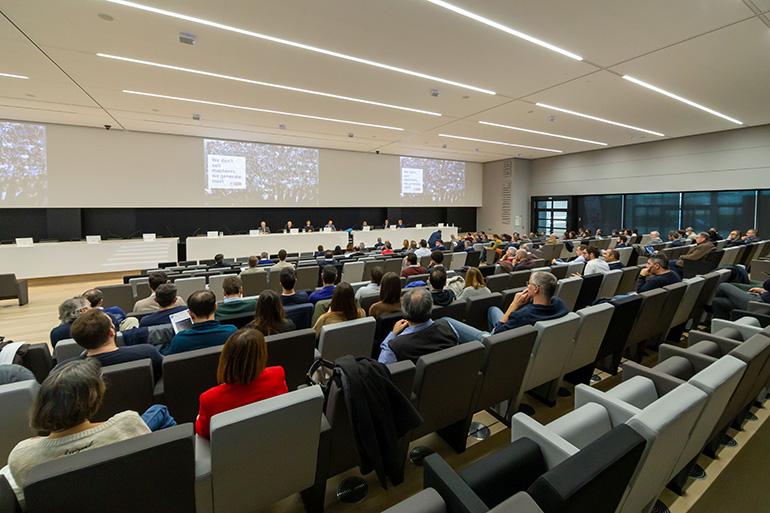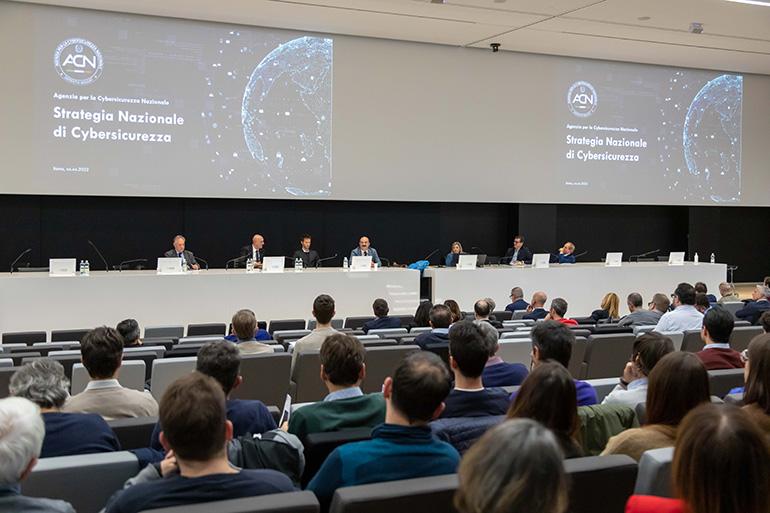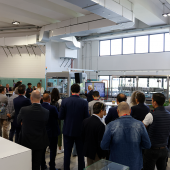Cybersecurity in business and society
At the “Fare sistema nella difesa cyber” (Working together on cyber defence) conference, organised by SACMI and Yoroi, cyber-security, inside companies as well as in relations with business partners, customers and also citizens, was discussed.

There has been a 300% increase in cyber-attacks on companies, entities and institutions only since the beginning of 2022: these were the numbers presented to SACMI’s 1919 Auditorium in Imola on 17 November, in which the theme was cyber-security, focusing on the relationship between business strategy, customers, associates and society as a whole.
An effective defence is based, in fact, on technological choices, but also on awareness and on the skills necessary at all levels of corporate relations. All this and how to propose concrete solutions to an increasingly widespread problem was discussed at the “Fare sistema nella difesa cyber: una necessità non più rinviabile” (Working together on cyber defence: a necessity that can no longer be postponed) conference promoted by SACMI and its partner, Yoroi.
Cybersecurity, considered as a phenomenon at system-level and not that of the single enterprise under attack was, therefore, the theme of a very well-attended meeting (over 110 participants) thanks to the interest in the topics covered and to the fact that it was open to institutions and schools that made up an audience keen to hear SACMI’s view on the subject. In addition, there was the contribution given by Yoroi, which supports the cooperative giant in the drawing up of the cyber resilience strategy proposal to apply both internally and in its external relations.
Research, institutions and enterprises oriented towards a shared objective: the protection of data and systems
The wide involvement of categories that go well beyond technical figures reflects a greater awareness of the risks linked to connected devices, especially for both private and business use. The speakers, in fact, pointed out the need to extend cybersecurity strategy to the extended relations of an organisation, given the tendency of cybercriminals to set up attacks directed at “indirect” flaws in the system. An example could be that of an employee or associate who, by mistake, communicates sensitive data using company devices for personal use, a widespread practice and permitted especially in the context of smart working and remote work; or, suppliers that access components of a smart factory without being adequately equipped with a cybersecurity strategy and, therefore, a potential means of access on the part of criminals.
- As the President of SACMI Paolo Mongardi affirmed, IT security has hit the headlines with the appearance of the connected factory, which has imposed a strategic reflection right from its introduction.
- Demonstrating what SACMI believes is a question of social as well as business relevance, the conference was attended by the councillor for productive activities of the Municipality of Imola, Pierangelo Raffini, who announced the establishment of “professional” courses in cybersecurity promoted in collaboration with the Metropolitan City of Bologna. This is a project which looks to SACMI as an example of best practice, an extraordinary resource for the territory in terms of production and as a lever of innovation.
- In the same vein, the University of Bologna took part with Michele Colajanni, who underlined how often defence measures are implemented when the attack has already been made, demonstrating the strategic role played by management in the definition of a cybersecurity strategy. A company’s cybersecurity policy, moreover, must be spread throughout all levels, with a top-down approach in which IT security means also physical security, given the ever-increasing integration between OT (operation technology, machines) and IT (information technology, IT systems) levels.
- Luca Nicoletti, service manager for industrial, technology, research and training programmes of the Italian National Cybersecurity Authority, finally underlined how Italy, although relatively behind other countries, today has the possibility to comply with best practices and act accordingly, also thanks to the significant resources made available by the NRRP, with 600 million earmarked for these areas, and by European programmes such as the “Digital Eu Program and Horizon EU” with more than 100 billion euros available to member states in the 2021-2027 budget.
A comprehensive strategy for cybersecurity
In its daily business practice, SACMI has had a model for some time to which to refer, thanks to a strategy defined upstream and illustrated to the audience by Marco Corsi, chief information officer, and Francesca Merighi, SACMI’s cyber security officer.
The cybersecurity team was created in 2017 with a dual objective: to make the IT infrastructure, composed of network, systems and data, secure, and to protect the company from risks that come from endpoints, that is, PC, tablets, smartphones assigned to employees and business partners. As part of the measures of a strictly technical nature, SACMI has added the definition of a security procedure and cycles of training on cyber risks directed to the group’s employees. More recently, moreover, a commitment has been made to secure production sites and plant and for the definition of ad hoc measures for products and services. The group, moreover, has a team of cyber specialists that work in close collaboration with the Yoroi’s external security operation centre, which operates 24/7, both for responding to cyber-attacks and for the detection of technical and organizational vulnerabilities, also with “preventive” security simulations.
At the end of the meeting, to offer a tangible experience to the participants, a simulation of a cyber-attack was carried out, a way to make the audience aware that at least 50% of IT risk depends on the “human factor” and, therefore, on an insufficient cybersecurity culture on the part of each individual employee, associate and business partner, for which the consultant plays a strategic role. According to Yoroi’s CEO, Marco Ramilli, in fact, the strategy linked to IT security is a managerial choice in which the external supplier provides their technical analysis expertise based on access to a wide range of cases and on observation of the continuous evolution of the typical attacker, who is able to utilize ever more refined and evolved cybercrime methods.


















